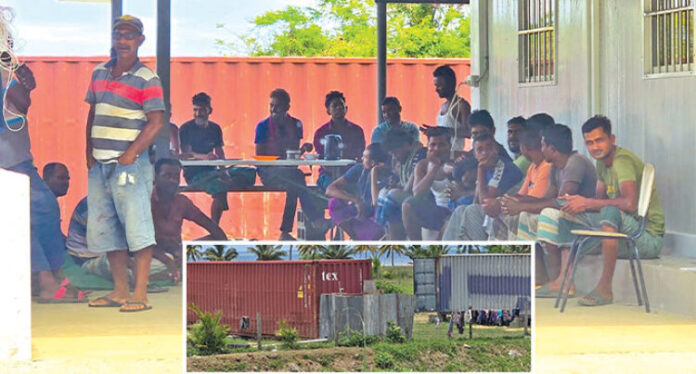Inhumane Living Conditions: The Case of Bangladeshi Workers in Volivoli, Fiji
A troubling case has come to light in Volivoli, Rakiraki, where 34 Bangladeshi migrant workers were unlawfully housed in poorly ventilated shipping containers for five long months. This shocking situation highlights the broader issues of labor rights and migrant worker exploitation in Fiji, a country increasingly reliant on foreign labor to bolster its construction and agriculture sectors.
The Discovery of Poor Living Conditions
Pacific General Builders, a construction company based in Lautoka and owned by Sunil Prasad, has faced serious allegations regarding the living conditions of its workers. The plight of these Bangladeshi laborers emerged after local and migrant workers reported their circumstances to the Ministry of Employment. Minister Agni Deo Singh confirmed that the Division of Anti-Human Trafficking Services at the Fiji Police had initiated an investigation to determine any elements of forced labor or human trafficking.
In response to the report, the Ministry issued a stop work order to Pacific General Builders and levied a fine of $10,000 for violating employment regulations.
A Glimpse into Their Daily Lives
When reporters visited the Volivoli site, they found the Bangladeshi workers seated outside the company office, awaiting assistance from immigration officials. Visible from the site were the containers where they slept and cooked using gas stoves. With five containers housing eight workers each, the men faced incessant heat, often having to leave the doors ajar at night for some semblance of fresh air.
Many of the workers had signed three-year contracts to help construct a resort in the area, but their living conditions starkly contradicted their expectations of safety and comfort. They spoke of a lack of adequate ventilation and indicated that conditions inside the containers were intolerable.
The Company’s Rebuttal
In defense of his company’s practices, Mr. Prasad refuted claims about the poor living conditions, arguing that the workers were not confined to the containers but rather stayed beside them. He dismissed the accounts of mistreatment, asserting that if there were any issues regarding wages or conditions, the workers could have raised them earlier.
However, when confronted with photographic evidence of the workers’ accommodations, which included makeshift bedding and cooking arrangements inside the containers, Mr. Prasad questioned the integrity of the images, implying a possible fabrication of the situation.
The Broader Context of Migrant Labor in Fiji
The exploitation of migrant workers is not an isolated incident but part of a larger trend observed in Fiji, where many South and East Asian workers face stark realities that often deviate from the promises made by recruiters. The U.S. government’s Trafficking in Persons report emphasizes the susceptibility of these workers to labor trafficking, particularly in sectors including construction and agriculture.
More broadly, the International Organisation for Migration has noted a significant increase in the number of Bangladeshi workers in Fiji since 2017, with this group becoming the second-largest nationality granted work-related permits in 2019. Unfortunately, many of these workers find themselves in precarious situations that mirror their experiences in other countries known for exploitative labor practices.
A Personal Testimony: Mr. Sahel Rana’s Experience
The plight of the Bangladeshi workers can be further illustrated through the experiences of individuals like Mr. Sahel Rana, a carpenter who faced similar issues while working for a trucking company in Fiji. Mr. Rana shared his story about being promised favorable working conditions and compensation that never materialized. Instead, after working longer hours than agreed upon, he had to return home, disenfranchised and disillusioned.
The Economic Impact of Migration
Bangladesh relies heavily on the remittances sent back by its expatriate workers. In September 2024 alone, the country recorded over US$2.4 billion in remittances, underscoring the critical role these overseas workers play in supporting their families and the national economy. Despite being a significant source of income for many families, the challenges and risks associated with overseas employment remain severe and often go unnoticed by those on the receiving end.
The Global Challenge of Worker Exploitation
The systemic exploitation of migrant workers is a global crisis. Reports from organizations such as the International Labour Organisation reveal that millions of migrant workers worldwide are often misled and forced into working conditions that are far from what was promised. This not only endangers their livelihoods but also tarnishes the promise of better opportunities abroad.
Conclusion
The disturbing situation faced by the Bangladeshi workers at Pacific General Builders serves as a potent reminder of the urgent need for improving labor protections for migrant workers in Fiji and beyond. While policies may exist to protect these vulnerable populations, enforcement remains a critical issue. As reports of mistreatment and exploitation surface more frequently, it is imperative that governments, organizations, and local communities take a stand to address these injustices and ensure that the rights of all workers are upheld. The path towards fair labor practices is long and fraught with challenges, but it is one that cannot be overlooked if we are to create a more equitable society for all.














